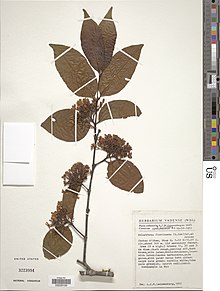Holarrhena floribunda
Holarrhena floribunda, commonly known as the false rubber tree, conessi bark or kurchi bark,[3] is a plant in the family Apocynaceae.
| Holarrhena floribunda | |
|---|---|
 | |
| Scientific classification | |
| Kingdom: | Plantae |
| Clade: | Tracheophytes |
| Clade: | Angiosperms |
| Clade: | Eudicots |
| Clade: | Asterids |
| Order: | Gentianales |
| Family: | Apocynaceae |
| Genus: | Holarrhena |
| Species: | H. floribunda |
| Binomial name | |
| Holarrhena floribunda | |
| Synonyms[2] | |
| |
Description
Holarrhena floribunda grows as a shrub or tree up to 25 metres (82 ft) tall, with a stem diameter of up to 30 centimetres (12 in). Its fragrant flowers feature a white corolla. The fruit is pale grey to dark brown with paired follicles, each up to 60 centimetres (24 in) long.[4]
Distribution and habitat
Holarrhena floribunda is found in a variety of habitats from sea-level to 1,000 metres (3,300 ft) altitude.[4] The plant is native to a wide range of West and Central Africa from Senegal to Angola.[1]
Uses
Holarrhena floribunda is locally used in traditional medicine as a treatment for dysentery, diarrhoea, fever, snakebite, infertility, venereal disease, diabetes and malaria. The plant has been used as arrow poison.[4]
References
- Botanic Gardens Conservation International (BGCI) & IUCN SSC Global Tree Specialist Group (2019). "Holarrhena floribunda". IUCN Red List of Threatened Species. 2019: e.T144299547A149056176. Retrieved 22 April 2020.
- "Holarrhena floribunda". World Checklist of Selected Plant Families (WCSP). Royal Botanic Gardens, Kew. Retrieved 22 April 2020.
- "Holarrhena floribunda". Germplasm Resources Information Network (GRIN). Agricultural Research Service (ARS), United States Department of Agriculture (USDA). Retrieved 22 April 2020.
- Medicinal Plants. PROTA. 2008. pp. 329–332. ISBN 978-9-05782-204-9.
External links
- Dressler, S.; Schmidt, M. & Zizka, G. (2014). "Holarrhena floribunda". African plants – a Photo Guide. Frankfurt/Main: Forschungsinstitut Senckenberg.
